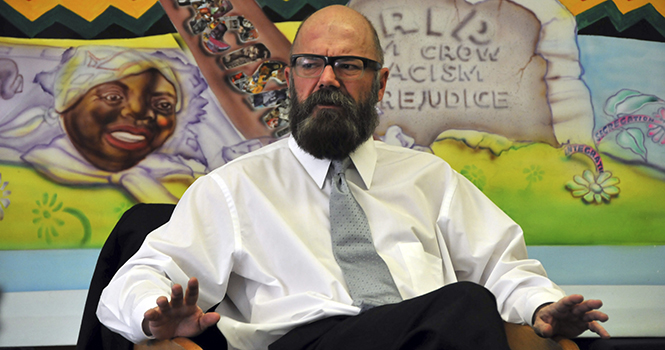Sullivan spawns varying responses at event
Conservative LGBT activist and author Andrew Sullivan speaks to a small group in the Multicultural room in the Student Center about same-sex marriage and where he thinks the United States is headed in terms of equality for minorities, on Tuesday February 12, 2013. Photo by Jessica Denton.
February 13, 2013
Andrew Sullivan, world famous political pundit, blogger, journalist and author, generated a heated discussion at the Knowing (and Loving) Thine Enemy: Gays, Conservatives and Common Ground event.
Sullivan covered the topics of Christianity, conservatism and homosexuality during his presentation, and his overarching message was that all people are human beings and should be given the same rights.
“I absolutely believe in the moral equality of every human being, of every race, color, background, gender, orientation or whatever,” Sullivan said.
Although this was his intended message, not everyone in the audience received the same message. The Kent State Young Democratic Socialists and Students for Justice in Palestine conducted a peaceful protest outside the Kiva.
John Hess, sophomore political science major and president of the Kent State Young Democratic Socialists, although pleased with the fact that Lesbian, Gay, Bisexual, Transgender and Queer issues would be discussed, did not agree with the choice of speaker.
“Andrew Sullivan is here to talk about why conservatives should be more gay friendly, which is something we absolutely support,” Hess said. “However, a brief look into Mr. Sullivan’s background yields some uncomfortable and startling information.”
The main issue the Young Democratic Socialists and the Students for Justice in Palestine had with Sullivan revolved around articles he wrote regarding a book called “The Bell Curve: Intelligence and Class Structure in American Life.”
Rachel Lebzelter, sophomore sociology major and member of the Young Democratic Socialists, was passionate in her views towards Sullivan’s articles regarding the book.
“The fact that he’s a journalist supporting faulty research — he should not be doing that as a journalist,” Lebzelter said. “People look to him for truths and what he says is true, that can infect society and generate more false truths.”
Despite the negative reactions to Sullivan’s lecture, there were also students who supported his visiting Kent State.
Steve Knapp, Kent State alumnus, said that he appreciated the thought provoking nature of the presentation.
“I appreciated his laying out his perception of what conservatism truly is,” Knapp said. “I like that he is trying to encourage religious people to diversify their perceptions of homosexuals because otherwise they’re shutting the door on cultural progress.”
Deborah Craig, coordinator of recruitment and scholarships for the Honors College, played an active role in bringing Sullivan to Kent State and was pleased with the turnout for the event.
“I love to introduce students to people who are in the news, people who raise controversial issues, people who cause others to think hard about issues,” Craig said. “I would love to see more, always, but I understand that there are many things that pull on student’s time, including classes and work and commuting and other activities in the evening, so I thought we had a very good turnout.”
Before the lecture in the Kiva, Sullivan conducted an informal questions and answers session in the Kent Student Center multicultural lounge. During the session, Sullivan covered topics such as gay marriage, the pope’s resignation and the Iraq war.
The intimate setting of the Q-and-A session resulted in a lasting effect on the audience. For example, Joshua Jones, sophomore electronic media production major, was intrigued by Sullivan’s life accounts.
“I really just wanted him to keep talking forever,” said Jones. “They were really good stories, and he never had any doubt. He knew exactly what he was going to say.”
Sullivan stressed the importance of not suppressing debate and said that he is not afraid of asking questions that may lead to uncomfortable answers.
“In the end, I think I’ve come to the conclusion at this point in my life, that we are what we are,” Sullivan said. “We need to understand it better. We need to resist the boxes people want to put us in. We need to acknowledge the complexity of our identities. We have to accept that, just as homosexuality is in some ways a mystery, so is heterosexuality.”












